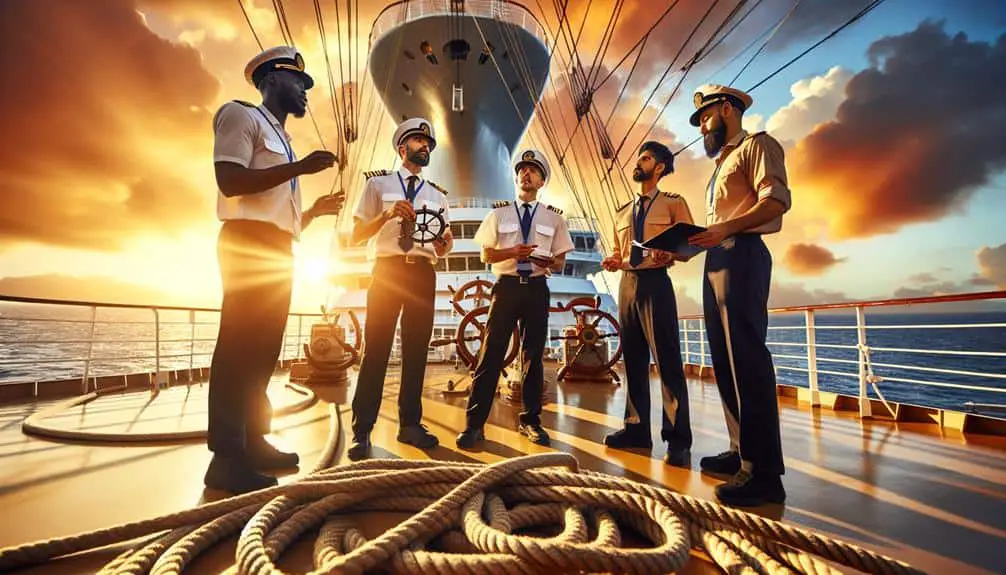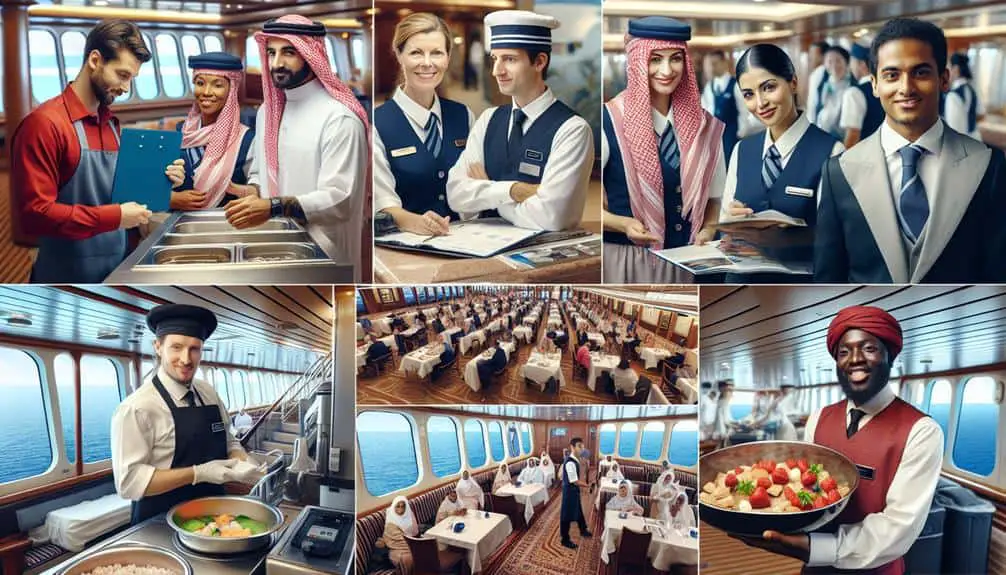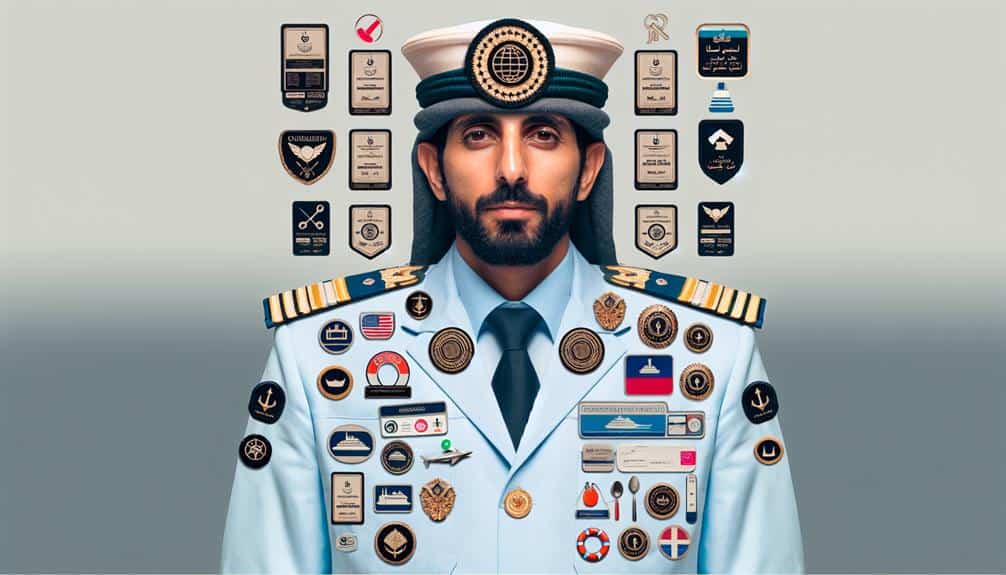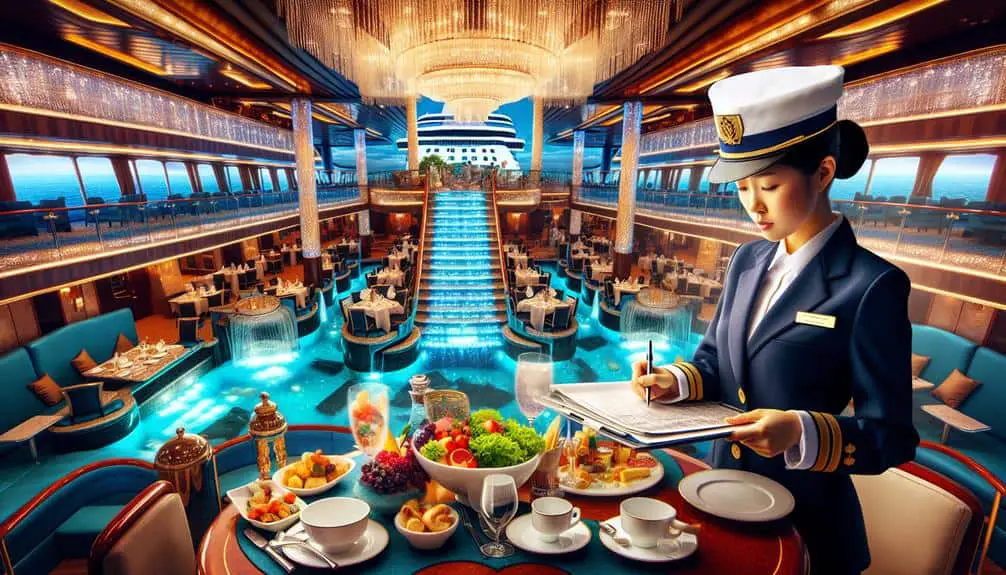To enhance crew teamwork on cruise ships: prioritize clear communication for seamless operations; establish trust and respect through consistent interactions; encourage cross-department collaboration for improved efficiency. Standardized protocols and active listening foster coordination, while building rapport and valuing diversity nurture trust and respect. Collaboration and team activities break down barriers, and training sessions promote mutual understanding. Rotate members across departments to foster appreciation and teamwork. Following these best practices guarantees a harmonious team environment onboard. Maximize efficiency, guest satisfaction, and safety by implementing these strategies.
Key Points
- Standardized protocols enhance coordination and efficiency among crew members.
- Building trust through consistency and integrity fosters effective teamwork.
- Encouraging cross-department collaboration improves team dynamics and efficiency.
- Active listening and clear communication prevent misunderstandings and promote harmony.
- Utilizing technology tools streamlines information flow for better teamwork.
Importance of Clear Communication
Effective communication is the cornerstone of successful teamwork among crew members on cruise ships. By ensuring that messages are conveyed clearly and succinctly, you can greatly enhance coordination and improve efficiency within the team. One key aspect of enhancing communication is establishing standardized protocols for sharing information. This could include using a specific communication channel for urgent messages or setting guidelines for reporting important updates.
Another vital factor in improving coordination is active listening. When receiving instructions or updates from fellow crew members, make sure to pay full attention and clarify any doubts immediately. Active listening not only helps in avoiding misunderstandings but also fosters a culture of open communication within the team.
Moreover, utilizing technology tools such as communication apps or digital platforms can streamline the flow of information and enable real-time updates, thereby further enhancing efficiency. By prioritizing clear communication and implementing strategies to improve coordination, you can contribute to a more harmonious and productive teamwork environment on the cruise ship.
Establishing Trust and Respect
To build a strong foundation for effective teamwork on cruise ships, crew members must prioritize the cultivation of trust and respect among one another. Building rapport is essential in establishing a cohesive unit where team members can rely on each other. This begins with open communication, active listening, and empathetic understanding. By showing respect for each other's roles and contributions, crew members foster unity and create a positive working environment.
Trust is the cornerstone of successful teamwork. It's nurtured through consistency, integrity, and reliability in fulfilling responsibilities. When team members trust each other, they can collaborate more effectively, knowing that everyone is working towards a common goal. Acknowledging each other's strengths and offering support in times of need strengthens the bond among the crew.
Respect is demonstrated through valuing diversity, recognizing individual skills, and appreciating different perspectives. By treating each other with dignity and consideration, crew members create a culture of respect that enhances teamwork. Through building rapport and fostering unity, crew members on cruise ships can establish a strong foundation of trust and respect, paving the way for seamless collaboration and exceptional guest experiences.
Encouraging Cross-Department Collaboration
Encouraging collaboration across departments on cruise ships enhances efficiency and fosters a more cohesive team dynamic. Team building activities play an important role in breaking down silos and fostering integration among different departments. To facilitate this integration, consider organizing cross-departmental training sessions where team members can learn about each other's roles and responsibilities. These sessions can help create mutual respect and understanding, ultimately leading to smoother collaborations when working together on tasks or projects.
Creating opportunities for departments to work together on specific tasks or projects can also encourage cross-department collaboration. For example, organizing a monthly inter-departmental competition or challenge can promote teamwork and communication across different areas of the ship. Additionally, rotating team members across departments for short periods can provide valuable insights into how each department operates, fostering a culture of appreciation and collaboration.
Frequently Asked Questions
How Do Crew Members Handle Conflicts or Disagreements That Arise During Their Work on a Cruise Ship?
When conflicts or disagreements arise on the ship, crew members handle them through effective conflict resolution and teamwork. They manage disagreements by fostering collaboration and open communication, ensuring a harmonious work environment that prioritizes cooperation and mutual respect.
What Strategies Are in Place to Ensure Effective Communication Between Crew Members Who Speak Different Languages?
Break down language barriers like a skilled navigator charts uncharted waters. Use shared experiences, patience, and empathy to bridge cultural gaps. Prioritize team bonding and trust building activities to guarantee effective communication among diverse crew members.
How Do Crew Members Manage Their Work-Life Balance While Living and Working in Close Quarters on a Cruise Ship?
To manage work-life balance on a cruise ship, prioritize mental health by setting boundaries, practicing self-care, and seeking support. Efficient time management is key; schedule breaks, engage in activities you enjoy, and maintain open communication with colleagues.
What Measures Are Taken to Promote Diversity and Inclusion Among Crew Members on Board?
As you navigate the diverse seas, crew members set sail on a voyage of understanding through diversity training and inclusion initiatives. Cultural competence charts the course, while team bonding anchors unity, ensuring a harmonious journey for all.
How Are Crew Members Trained to Handle Emergency Situations and Ensure the Safety of Passengers and Fellow Colleagues?
In emergency situations, crew members undergo rigorous safety training to guarantee swift and effective emergency response. This training equips you with the necessary skills to handle crises and prioritize the safety of passengers and colleagues.




